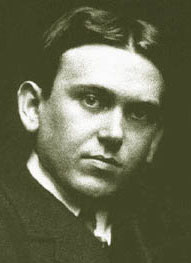
Over at Why Evolution is True, Professor Jerry Coyne has been busily promoting the writings of a man he describes as “The First New Atheist”: the acclaimed writer, H. L. Mencken (1880-1956). Professor Coyne promised his readers one week of daily posts featuring quotes from the great essayist, on the follies of religion, and he’s kept his word: he’s just completed Day Seven of his postings.
When I first read of Professor Coyne’s choice of patron for the New Atheist movement, I quietly marveled. Professor Coyne is a very well-read man, and when he makes a choice, you can be sure that he has given it a lot of thought. It was he who officially declared Aratina Cage’s logo of a red A with two horns to be the Gnu Atheist symbol, and his choice has been vindicated by the surge in the logo’s popularity. I therefore have to assume that Coyne knew what he was doing when he nominated H. L. Mencken as the patron of the New Atheist movement. So far, visitors to his Web site have strongly supported Coyne’s choice. Coyne has been very enthusiastic in his promotion of Mencken, even going so far as to refer to him as “the imperishable Henry”. What’s next, I wonder? Will we see a readers’ contest for the best halo design?
Now, when one nominates a patron for one’s movement, one should be careful to nominate an individual whose greatness is readily apparent and whose faults, whatever they may be, are capable of being overlooked. A patron need not be perfect, but he/she should be, at the very least, an admirable person: a pioneer in whose steps others can follow. To his credit, Professor Coyne has acknowledged Mencken’s vindictiveness; but this is hardly a fatal flaw.
The reason for my quiet astonishment when I learned of Coyne’s choice of a patron for the New Atheist movement was that only two weeks before, I had stumbled upon some very interesting quotes from H. L. Mencken’s writings on pages 397-398 of Thomas Sowell’s Intellectuals and Society (Basic Books, Revised and expanded edition, 2012). I therefore knew that Professor Coyne’s nomination of H. L. Mencken as the First New Atheist was an extremely inopportune one – and that’s putting it mildly. For the information I now had about Mencken could fairly be described as political dynamite. Yes, I said “dynamite.”
Surely Coyne must know, I said to myself. Surely someone would have tipped him off about Mencken’s opinions. And early this week, I found out that he did know. For the last few days, Coyne has been quoting from a little-known book by Mencken, titled Minority Report: H. L. Mencken’s Notebooks (Alfred A. Knopf, New York, 1956), which was published in the final year of Mencken’s life. It’s an old book, but Johns Hopkins University Press issued a new edition in 2006. I strongly urge people who like collecting rare books to buy it ASAP, before the 15 remaining new copies get snapped up. Alternatively, viewers can read the book online here,which is where I discovered it. Over at his Web site, to the great delight of his readers, Professor Coyne has been gleefully quoting humorous passages from the book, in which Mencken tears apart what he regards as the patently absurd claim that science and religion are compatible.
Now, I’d be the first to acknowledge that Mencken was an extraordinarily gifted writer, even though I disagree with most of his opinions. But when I actually read Mencken’s “Minority Report” for myself, I discovered that Mencken’s views were even more awful than the ugly sentiments quoted in Thomas Sowell’s book. I don’t think Coyne’s readers will thank him for nominating Mencken as the first New Atheist after they’ve read this post. They’re more likely to ask him, “What were you thinking?” I’d say Professor Coyne definitely has some explaining to do. I sincerely hope he does so, and I am looking forward to his response.
So, who was H. L. Mencken?

H. L. Mencken in 1932. Image courtesy of Wikipedia.
Readers under the age of 40 might not know H. L. Mencken, so I’d better introduce the man. To most people, Henry Louis Mencken is best-known as the author of The American Language, an acclaimed and highly readable study of how the English language is spoken in the United States, and for his reporting on the 1925 Scopes trial, which he dubbed the “Monkey Trial.” (By the way, if you want to know what the movie Inherit the Wind got wrong about the trial, click here. Short answer: practically everything.) Mencken is also widely admired as a peerless satirist, a hard-hitting journalist and an acerbic critic of Christian fundamentalism, organized religion, anti-intellectualism and Prohibition.
But who was the real H. L. Mencken? In this post, I have put together a collection of excerpts from his writings, with the aim of demonstrating that despite his personal warmth, his generosity, his unfailing courtesy to women and his unflagging loyalty to his friends, the man held appalling and callously inhuman views, even for his time, on matters relating to race, eugenics, crime and punishment.
To continue, click here.